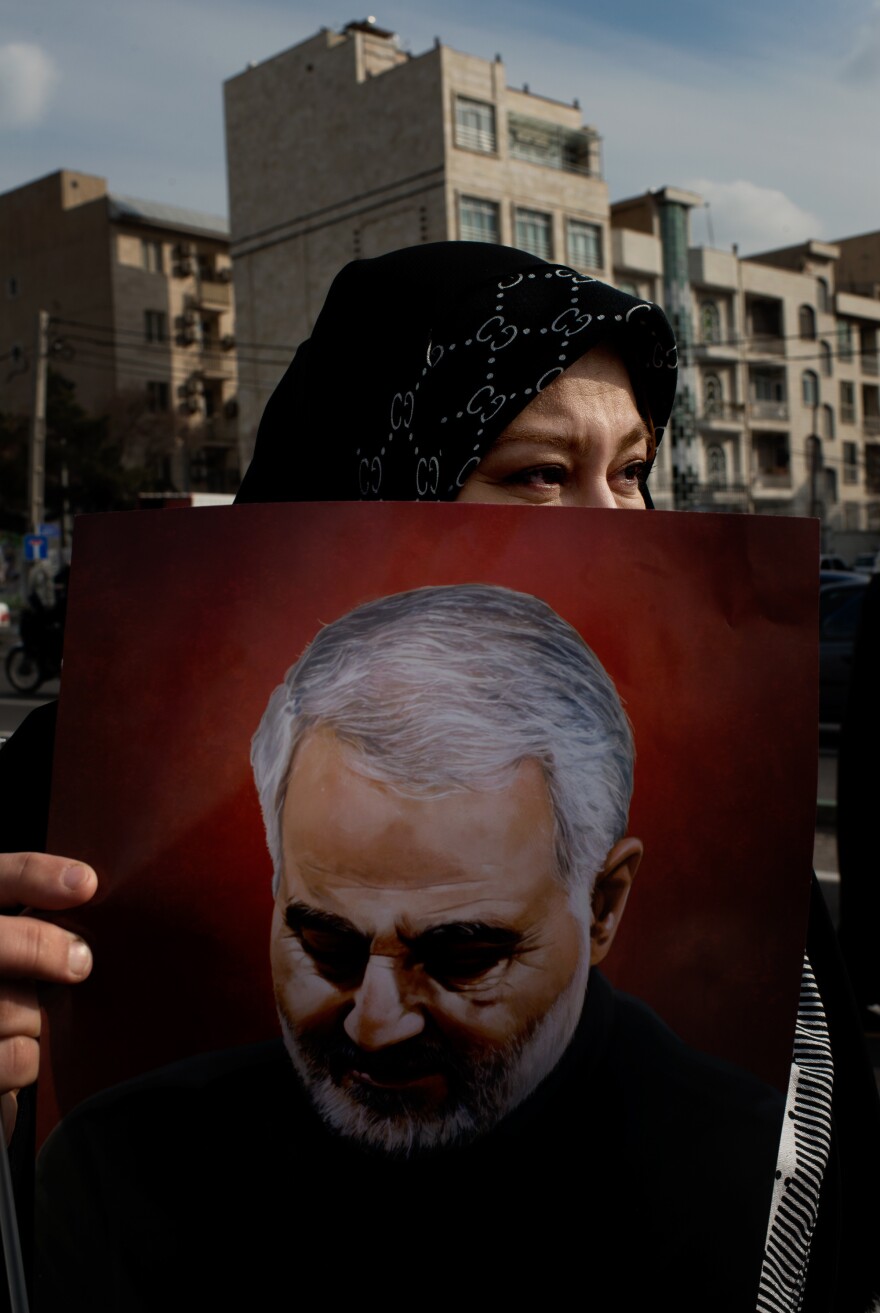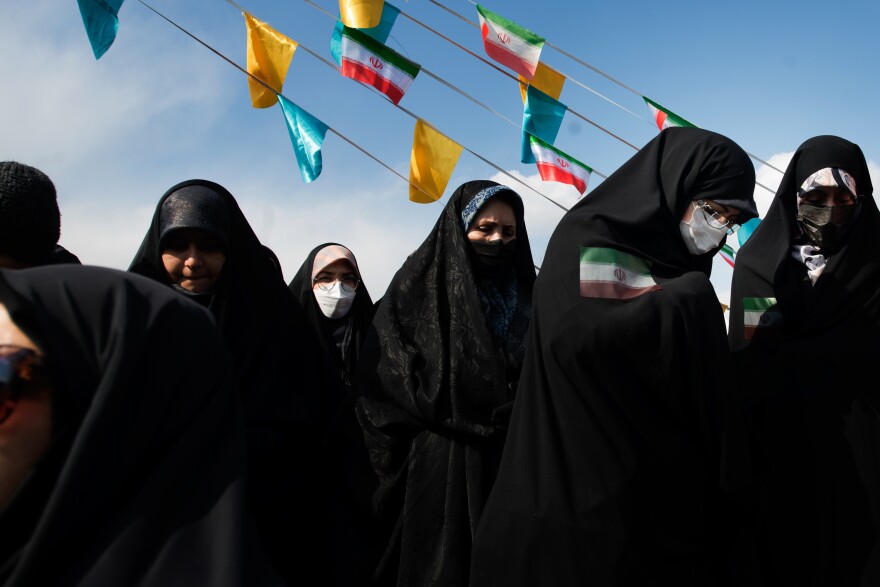TEHRAN — On Friday, the eve of the 44th anniversary of the Iranian Islamic Revolution, celebratory fireworks lit up Tehran's night sky. Within minutes, the show was interrupted with cries of "freedom" "death to the dictator" and "death to Khamenei," Iran's supreme leader, ringing from apartment windows. Then, chants of "God is great" as supporters of the regime chimed in.
The moment demonstrated the divisions playing out in Iran, five months after the death of Mahsa Amini. The anti-government chants are the same ones shouted at protests that shook the country in the wake of Amini's death in police custody in September. She had been detained after the so-called morality police accused her of wearing improper attire, or not covering her hair. Iranians rose up in anger, demanding change and a stop to what they call the regime's oppression of its citizens and mismanagement of the economy.
The government's brutal crackdown on the protests — which, according to the U.N. Human Rights office, has included the detention of thousands, and the executions of at least four people so far — appears to have largely succeeded in scaring dissenters off the streets. Rights groups also claim security forces have killed hundreds of demonstrators. So, underneath a veneer of normalcy, grievances fester.
Beginning days before Revolution Day, Iranian cities were draped in the red, white and green colors of the Iranian flag. Fresh posters went up with the faces of Ayatollahs Khomeini and Khamenei, the first and current supreme leaders of Iran, respectively. On Saturday, huge crowds turned out for a rally that poured into Tehran's Azadi Square. The message from Iran's leaders: Everything is under control, and Iran is united.

Other Iranians skipped the celebrations and stayed home on Saturday.
Asked his plans for Revolution Day, one carpet dealer in the city of Isfahan, replied, "Sleep." Like many people in this story, he spoke on the condition that he not be identified, because of the risks of publicly criticizing the regime. Those discussing the government also often didn't want to be photographed.

Many feel the revolution has not delivered on its promise
In 1979, several factions of Iranian society, including secularists, Islamists and leftists, were united against the rule of Shah Mohammad Reza Pahlavi. The Shah came to power after a 1953 coup d'etat — instigated by the United States and Britain — which overthrew the previous, democratically elected leadership. Supporters of the 1979 revolution hoped to bring a democratic system back to Iran. The Shah was known as a ruthless autocratic leader and used torture and executions to stifle dissent. Today, critics accuse the Islamic Republic that took power after the revolution of similar tactics.
Still, many Iranians who express ambivalence about the regime still revere the revolution itself. Mortaza, a 63-year-old university professor, joined the celebrations in Tehran on Saturday. "I didn't come for Mr. Khamenei," he said. "I came for the revolution."
Even though he's critical of the government, especially the treatment of Mahsa Amini, he said it was important that Iran is independent and sovereign.
But others who believed in the revolution in 1979, today look back with regret.
"The celebration is losing its color," said a 53-year-old woman walking with her father in the city of Isfahan, the day before the anniversary. Her father opposed the Shah, and when she would repeat the propaganda she learned in grade school, he'd gently explain Iran's many problems.
He was 43 years old when the Islamic Revolutionaries took power.
"At the time we were very happy, but we paid a price," said her father. He lost a son in the Iran-Iraq war that followed.
"We were tricked. They were false promises."
The family had no plans to celebrate the anniversary.

Dissent continues to simmer in Iran, but opinions vary on recent protests
Even at the Revolution Day rally in Tehran, people who supported the regime expressed grievances against particular policies. Maryam, a homemaker, was walking to Azadi Square in a loosely donned cobalt blue headscarf, and told NPR that she wanted many changes, including around the hijab, a religious practice that the regime made mandatory for women in 1983.

"People who don't want to wear the hijab, or want to wear it in their own way should be allowed to do as they wish," she said. "But that doesn't mean we don't support the Islamic Republic or that we want it to change."
Maryam was born the year of the Islamic Revolution, but she has never been to any of the celebrations marking the day.
"This year I felt that it is necessary," she said. "Because of the violent protests that took place, I feared that there might be a civil war."
A 21-year-old college student who spoke with NPR the day before Revolution Day said that the campus protests she had taken part in after Mahsa Amini's death were peaceful: "Not setting on fire things, not breaking down anything. Just walking and telling our rights."
Like many Iranians, she had complicated views about the regime. She didn't plan to celebrate the anniversary of the Revolution, and doesn't support Iran's leaders. But she also said she respects them.
She wants change, but feels the protest movement lacks a leader: "I mean an actual leader, who loves people."
Still, despite the regime's crackdown, she says the protests aren't over. Activists are still spreading messages online through social media.
"Teenagers and other people are back home and not coming out anymore, but it is not completely finished," she said.
"It's hard. Our government won't go easily. But we will replace them."
Fear of foreign intervention persists

As the masses made their way to Azadi Square, nationalist and religious songs were played, the crowds chanted reverent slogans for Supreme Leader Khamenei and the Revolution. Some of their favorite mottos were "death to America" and "death to Israel" as they displayed banners with the same words.
A few people who spotted NPR journalists doing interviews took pains to explain that the slogans were against America's politics, not its people. "We love you," one man said.
A woman in her 50s implored in English: "Please, please, please be honest. Be honest." When asked what it was she wanted NPR to know, she said: "The reality. The reality. This is the reality," she answered, pointing toward the square.
The regime has argued that protests, which they have called "riots", were encouraged by "outside forces." There was a fear among many in the crowd that the US wants to intervene in Iranian affairs again, as it did in the 1953 coup.
"We want to protect our country from all the invasions all over the world," said Fatemah, a 41-year-old woman. She wore a black chador — an open cloak worn by many conservative women in Iran. "And the most important country that has invaded our country is your country. Anything bad happening for our country is from the United States unfortunately."

Iran's hardline president Ebrahim Raisi gave a speech at the square, which piped over loud speakers. It was briefly hacked as it streamed online, by a group that encourages people to keep protesting.

In his speech, Raisi alluded to the protests and said they were a project of Iran's enemies.
"Those who have been deceived by the enemy now know that the enemy's issue is neither woman, nor life nor freedom," he said, a nod to the main slogan of the protest movement.
And there are mixed feelings from women in Iran. "I'm very proud to be a woman in Iran and living in Tehran in an Islamic country, and I'm very happy," Fatemah said. "Yes, there are problems here, and there are many problems in other countries but we should build our own country, others should not decide for us."
Iranians want economic changes
One thing almost all Iranians are united on, no matter their political leanings, is that the government needs to do more to fix the country's sputtering economy. Inflation is high, and the Iranian rial recently tanked even further against the dollar after the protests. Combined with U.S. sanctions, Iranians say they can no longer afford basic needs.
Seyed, a 33-year-old man who was born in Iran, but spent most of his life abroad in English-speaking countries, said the economy is the reason why he decided to join the rally.

"I'm definitely here to support Iran and I'm definitely here to tell the government that we need to do some serious changes, especially when it comes to the economy," he said. Adding that the government needs to prioritize policies that allow "the average Iranian to have an ordinary life."
A 21-year-old woman walking with a poster of Ayatollah Khamenei told NPR that she loves the supreme leader.
"He is wise, a good leader and very lovely," she said.
But as an economics student in college, she's worried about the country.
"We want similar things from the government [as the protesters did], especially when it comes to the economy, but we don't believe in setting fire to the country," she said.
Mixed predictions on the regime's long-term survival
The nationwide events on Saturday served to project that the government is in control, after several tumultuous months, in which critics and analysts alike questioned whether another revolution could be near.
Iranians who spoke to NPR had different opinions on where their country is headed.
Asked if she though the regime would still be around in another 44 years, the 53-year-old woman in Isfahan, who was a child under the Shah's regime, said "Never, never."
"Because the youth of our country are so much awake and there is the sense of freedom in them," she said. "I don't think it will last for another two years."

65-year-old Mohammed Reza, who was walking in Tehran's rally, said the government and the revolution are separate things.
"Each government comes and goes," he said. "What is important is Iran and the Islamic Revolution, born with the blood of the martyrs."
Several people at the rally pointed to other countries in the region, like Libya and Iraq, which struggled after authoritarian leaders were removed from power.
For Seyed, the Iranian who lived abroad, the situation is very clear.
"If anything happens to this government or this revolution, what comes next is definitely worse," he said.

Marjan Yazdi is a photojournalist based in Yazd, Iran. You can see more of her work on her website marjanyazdi.com or on instagram @marjankyazdi.
Photos edited by Ben de la Cruz/NPR.
Copyright 2023 NPR. To see more, visit https://www.npr.org.




